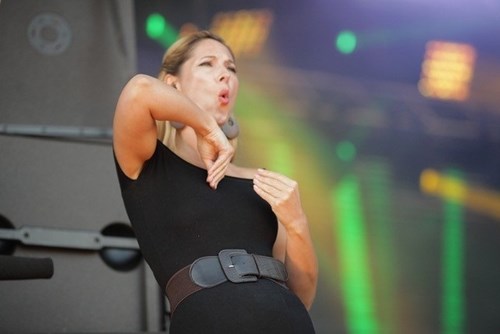Performance interpreter
Each issue, a different professional shares their expert advice and gives information to help you support your child. This time Marie, a performance interpreter, shares her thoughts.
Spring 2023 Families magazine

What does your job involve?
We provide British Sign Language (BSL) interpreters and deaf performers to the music and entertainment industry. This can include music concerts, festivals, theatre shows, the circus and talks.
We work with the organisers to plan the BSL access, looking at the position of the interpreter and the lighting. When we interpret, we use a lot of performance skills, body language and non-manual features [movements that don’t involve the hands, for example facial expressions] to portray the attitude and persona of the artist. People think it’s about sound, but it’s about the feeling you’re left with at the end of a song.
How do you prepare for each show?
We take time learning the script of all the songs, translating them into BSL, and checking the translation matches the rhythm and meaning of the song.
How can deaf young people or parents of deaf children find out if the show they want to attend is interpreted?
Deaf and hearing parents should know that they can and should take their children to anything they want to see. You can contact us and we can help you to make contact with organisers for free. We would always recommend giving us 30 days’ notice for a show. Reasonable adjustments also include captions so you can request those as well. You can also check the venue website to see if an interpreter is already arranged; we’re working with venues to ask them to have this information in BSL video too.
All of our performers are qualified BSL interpreters and have specialist performance training, led by deaf people. The entertainment industry is open to everyone.
What’s your favourite thing about your job?
Seeing people smile and come together for the performance with family and friends is really special. Also, some of the artists I’ve worked with, Ed Sheeran and Adele in particular, both really acknowledge their deaf fans at their performances which I really appreciate.
I also love working with other deaf performers. I’m deaf in my left ear and being able to provide a platform for deaf talent is amazing.
What’s the most challenging thing?
We get the set list very last minute, so we have to do a lot of guess work and research. We could spend 50 to 100 hours preparing the songs and some of them might not even be performed!
Why do you think it’s so important that shows are accessible?
There are so many barriers to fight as a deaf person, but I’ve realised how important it is to have access to entertainment for mental wellbeing. We see people cry, laugh and dance at the shows and it’s beautiful to witness.
To get in touch with Marie and her colleagues, go to performanceinterpreting.co.uk.
